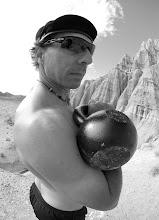After years of working on my own fitness from my feet up, I did my first actual "barefoot" run last week on pavement and concrete. It did not last long—only 1/4 of a mile which was PLENTY! I need to share some comments on barefoot running—and running in the VFFs (Vibram Five Fingers) or any other minimalist shoe such as the New Balance Minimus Trail and others out or that will be coming out soon…to keep everyone informed and safe.
I have said for a few years there are many benefits to increasing your "foot fitness" with barefoot walking around the house, barefoot workouts especially with ballistic power activities like kettlebells or martial arts, and just generally increasing the fitness from the ground up. I have always stopped short of actually recommending "barefoot running" (or running in VFFs) although often report on the developments of this trend regarding injury prevention, shoe design trends, etc.
Please take note—there is a HUGE difference between walking barefoot and actually running barefoot or running with minimalist shoes! Make no mistake—running barefoot is serious foot fitness! I've got a friend really into barefoot running. His recommendation even for me with years of barefoot walking and kettlebell training was to limit my initial barefoot run to just 1/4 of a mile—no more! While that sounds insignificant, I can tell you it is not. After only 1/4 of a mile, my feet were sore that evening.
From a safety perspective, there are some serious injuries that can occur if you just go out without a build up process and start running without shoes. To be honest—the result will not be good. Actual barefoot running (No VFFs or shoes of any kind) can cause serious burns, abrasions, and other biomechanical issues sometimes in less than ONE MILE. Bypassing the safety recommendations can likely put you in the hospital or at least in the podiatrist office treating the wounds on your feet.
I've been reading and hearing about some overuse injuries from hitting the pavement unshod without the proper preparation, so again, while I don't actually recommend that people run in bare feet or minimalist shoes, if you do, please limit the exposure and have plenty of practice just walking for MONTHS before you ever actually run. If you do start running completely barefoot, don't go over 1/4 of a mile to start and never begin on hot pavement!!! What I do recommend is that people run with a Nike Free shoe or equivalent because this is a "step" in the right direction as these shoes are more flexible. Even with the Nike Frees, you have to gradually increase your exposure because your feet will be working much harder than with traditional running shoes. I also like people to walk in the Nike Free shoes because everyone so far that I've had buy these has reported less or no foot pain. Flexible shoes in general are better for feet. While there are going to be a few exceptions, I've seen great results when people were more flexible shoes—sometimes the very first day.
If you want to learn about barefoot running from a really knowledgeable source, Michael Sandler, the author of "Barefoot Running" and foot force behind the RunBare.com website, is doing numerous FREE clinics in the SoCal area in June before heading to NorCal in early July. I will be attending at least one of them—the one at Adventure 16 in West LA or Runnergy in Sherman Oaks. The clinic links are below:
http://runbare.com/category/events/upcoming
I'm also launching a new "Foot Fitness" workshop in June. While not a specific workshop on barefoot running, I will address the topic, barefoot and shoe trends, and make some recommendations. My workshop will be focused on the general fitness of the foot and ankle regarding Z-Health mobility drills, how to use some valuable therapy tools for correcting plantar fasciitis, and how to determine "foot-friendly" shoes.
For more on what I've up to in the world of feet, here's my Foot Fitness section:
http://www.ronjones.org/Feet/index.html
Take care of your feet, and when it comes to feet especially, safety first! If you do want to run with completely bare feet, that's fine and your choice—just understand the potential risk if you are not prepared or exceed your body's capacity for the extra challenges.
In Health, Coach RJ
Wednesday, June 15, 2011
Subscribe to:
Posts (Atom)

